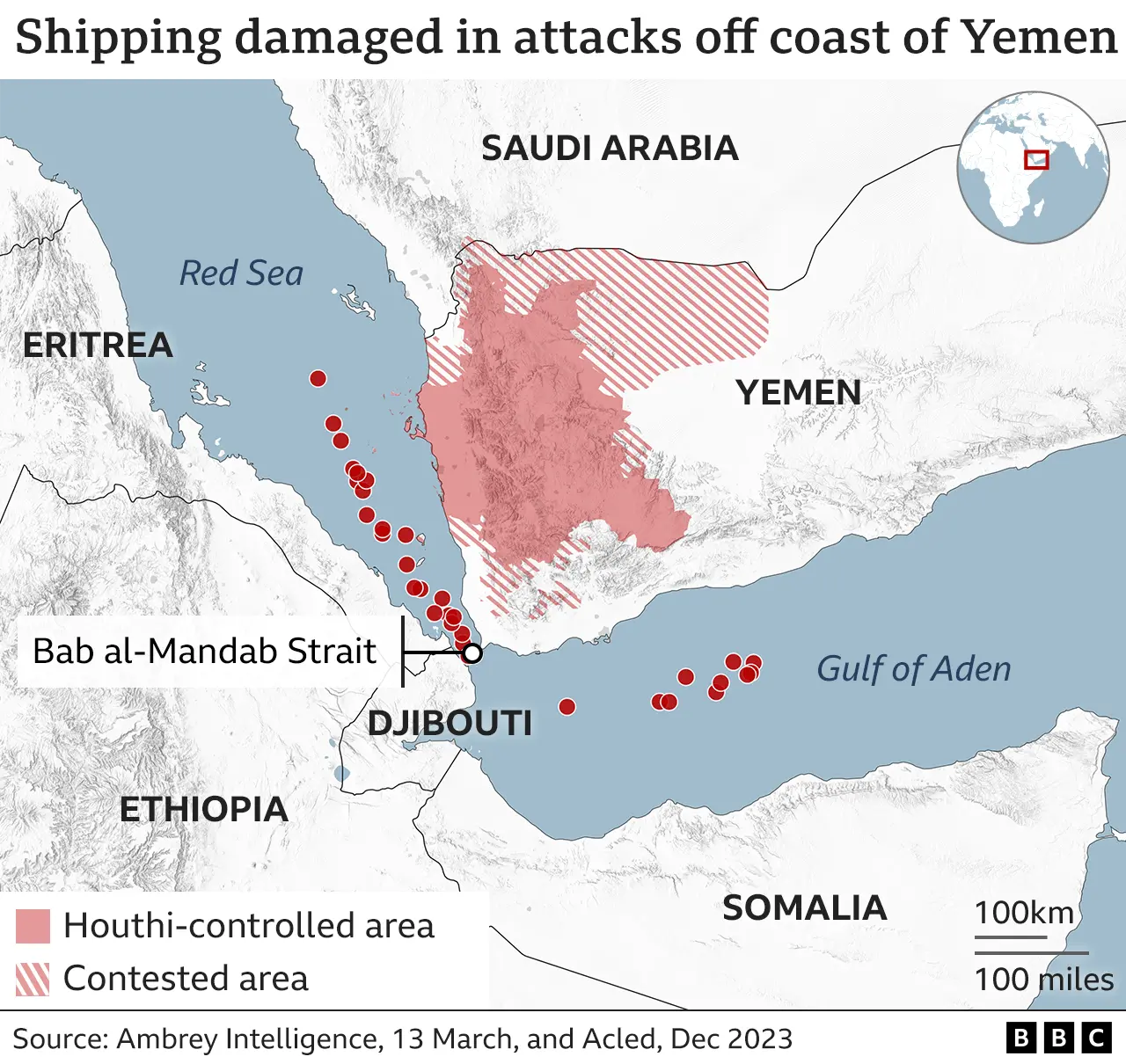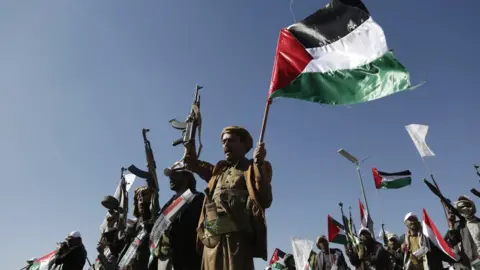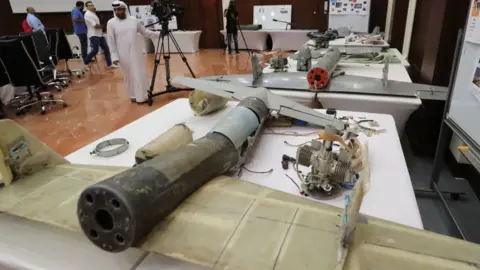Date: Tuesday, 19 March 2024
 Getty Images
Getty ImagesHouthi rebels have launched more than 40 attacks on commercial ships in the Red Sea and Gulf of Aden since November.
The Houthis are an Iranian-backed rebel group which considers Israel an enemy.
In response to the war in the Gaza Strip, the Houthis started firing drones and missiles towards Israel. Most have been intercepted.
On 19 November, the Houthis hijacked a commercial ship in the Red Sea.
They have since launched dozens of missile and drone attacks on commercial ships. Of these, 34 have resulted in reported damage to vessels.

The Rubymar, a cargo ship which was hit in February, later sank.
On 6 March, three crew members were killed in a missile attack on the Barbados-flagged cargo ship True Confidence.
US-led naval forces have thwarted many attacks.
The Houthis initially said they were attacking ships connected with Israel, or heading to or from there. However, many of the vessels have no connection with Israel.
In response to US and UK air strikes on their positions, the Houthis have more recently targeted ships tied to owners or operators in the UK or US.
Major shipping companies have stopped using the Red Sea - through which almost 15% of global seaborne trade usually passes - and are using a much longer route around southern Africa instead.
The US and UK started carrying out air strikes on Houthi targets in Yemen on 11 January. There have been several more strikes since then.
President Joe Biden said they were in "direct response" to the attacks on Red Sea ships, which "jeopardised trade, and threatened freedom of navigation".
The Houthis are an armed political and religious group which champions Yemen's Shia Muslim minority, the Zaidis.
They declare themselves to be part of the Iranian-led "axis of resistance" against Israel, the US and the wider West - along with armed groups such as Hamas and Lebanon's Hezbollah movement.
Formally known as the Ansar Allah (Partisans of God), the group emerged in the 1990s and takes its name from the movement's late founder, Hussein al-Houthi. The current leader is his brother, Abdul Malik al-Houthi.
In the early 2000s, the Houthis fought a series of rebellions against Yemen's long-time authoritarian president, Ali Abdullah Saleh. They wanted greater autonomy for the group's homeland in the north of Yemen.
 Getty Images
Getty ImagesDuring the 2011 Arab Spring, a popular uprising forced President Saleh to hand over power to his deputy, Abdrabbuh Mansour Hadi.
President Hadi's government was overwhelmed with problems. The Houthis seized control of the northern province of Saada before taking the Yemini capital, Sanaa, after forming an unlikely alliance with Saleh and security forces still loyal to him.
In 2015, the rebels seized large parts of western Yemen and forced Mr Hadi to flee abroad.
Neighbouring Saudi Arabia feared the Houthis would take over Yemen and make it a satellite of its rival, Iran.
It formed a coalition of Arab countries that intervened in the war. But years of air strikes and ground fighting have not dislodged the Houthis from most of the territory they seized.
Saudi Arabia is now trying to make a peace deal with the Houthis, and a UN-brokered truce has been in effect since April 2022.
The war has killed more than 160,000 people, according to the Armed Conflict Location & Event Data Project (ACLED). More than four million people have been displaced.
The US says Iran enabled the Houthis to target ships, and President Biden has sent a "private message" to Tehran urging it to stop. Iran has denied involvement.
Saudi Arabia and the US say Iran has smuggled weapons - including drones, and cruise and ballistic missiles - to the Houthis during Yemen's civil war in violation of a UN arms embargo.
It says such missiles and drones have been used in attacks on Saudi Arabia, as well as its ally, the United Arab Emirates.
 Getty Images
Getty ImagesIran denies supplying weapons to the Houthis and says it only supports them politically.
"The Houthis could not operate at this level without Iranian arms, training and intelligence," says Dr Elisabeth Kendall, a Middle East specialist at Cambridge University.
However, she adds: "It is unclear that Iran has direct command and control over the Houthis."
According to the Italian Institute of International Political Studies, Iran has helped the Houthis build factories to make drones in Yemen.
The Houthis have also received military advice and support from the Lebanese Islamist group Hezbollah, the US-based Combating Terrorism Center at West Point Military Academy says.
The Houthis control Sanaa and the north-west of Yemen, including the Red Sea coastline.
Most of Yemen's population lives in these areas, and the Houthis run a de facto government which collects taxes and prints money.
The internationally-recognised government of Yemen is based in the southern port of Aden.
It is overseen by the eight-member Presidential Leadership Council, to which President Hadi handed power in 2022.